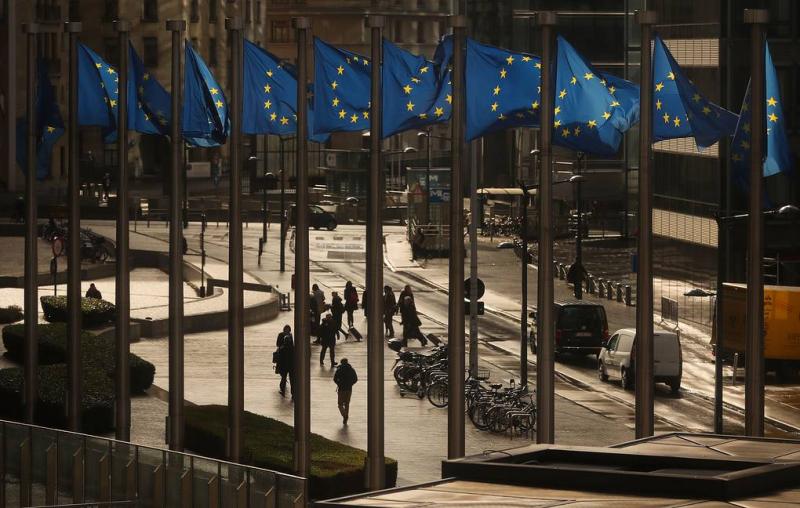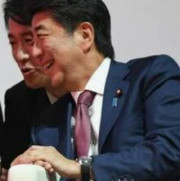
© AP Photo/Francisco Seco/TASS
Top stories from the Russian press on Monday, November 28th, prepared by TASS
Russia and the IAEA are in talks on the establishment of a safety zone around the Zaporozhye Nuclear Power Plant, the outcome of Taiwan’s local elections may help ease regional tensions and the European Parliament seeks to prevent the restoration of the Nord Stream gas pipelines. These stories topped Monday’s newspaper headlines across Russia.
Vedomosti: Moscow engages in talks with IAEA on safety zone around Zaporozhye nuclear plant
Moscow is in talks with the International Atomic Energy Agency (IAEA) on setting up a safety zone around the Zaporozhye Nuclear Power Plant, Russian Permanent Representative to International Organizations in Vienna Mikhail Ulyanov said. The statement came after Director General of Russia’s Rosatom State Atomic Energy Corporation Alexey Likhachev had warned that shelling attacks on the Zaporozhye NPP were creating the risk of a nuclear accident, Vedomosti notes.
The Zaporozhye Nuclear Power Plant started coming under fire again on November 19-20. IAEA chief Rafael Grossi called for an immediate end to the attacks on the facility though he did not name the forces behind the shelling. On November 23, Grossi held talks with Likhachev on the situation around the nuclear power plant.
The presence of even a few IAEA observers at the Zaporozhye NPP made it possible to minimize the number of attacks, and it also allowed the agency’s head Grossi to receive information from the site, Atominfo Editor-in-Chief Alexander Uvarov told Vedomosti. "However, IAEA observers and the organization itself aren’t authorized to reveal information about who carries out the attacks as their job is purely technical," he said. The expert believes that Russia is interested in a United Nations observer mission that would have broader powers, particularly in terms of identifying the attackers. In addition, it will be possible to expand the mission in case observers carry out their work under UN auspices. The United Nations does have experience in supervising nuclear facilities in cooperation with the IAEA, Uvarov pointed out.
Although the IAEA has distanced itself [from assessing who is shelling the Zaporozhye NPP], the attacks need to stop, Deputy Chairperson of the Russian State Duma Foreign Affairs Committee Svetlana Zhurova told the newspaper. "Here in Russia, we would like international institutions to confirm and the international community to see that it’s not us who is doing this," she noted.
Nezavisimaya Gazeta: Russia, Kazakhstan to reaffirm strategic relations
Kazakhstan’s President Kassym-Jomart Tokayev will visit Russia on November 28, making his first visit overseas after being re-elected as head of state. Tokayev’s talks with Russian leader Vladimir Putin are expected to focus on ways to boost partnership and the prospects for cooperation within Eurasian integration associations, Nezavisimaya Gazeta writes.
In a message congratulating Tokayev on his re-election, Putin pointed out that strategic partnership and allied relations between Moscow and Astana were progressing quite successfully.
No one is interested in reconsidering Russia-Kazakhstan relations at the moment. "No dramatic and serious changes should be expected with regard to the relationship between Astana and Moscow," said Arkady Dubnov, an expert on post-Soviet countries. According to him, Moscow will primarily seek to intensify cooperation with Astana both on the bilateral level and within the Eurasian Economic Union.
However, some of the steps that Moscow had taken in a bid to keep Astana in check eventually boomeranged against Russia’s interests. The Kazakh leadership promptly handed down instructions to find ways to redirect the flow of Kazakh hydrocarbons to other routes bypassing Russia. Still, Kazakhstan does not deliberately seek to raise tensions with the Kremlin, the political scientist added.
"Given the chaotic situation across Eurasia, CIS partners are looking for ways to dodge the West’s secondary sanctions while establishing cooperation with Russia," Dubnov emphasized. In his view, Moscow should search for common ground because if Kazakhstan’s alienation from Russia goes on to involve institutions, it may lead to unpredictable consequences.
Izvestia: European Parliament seeks to prevent restoration of Nord Stream pipelines
The European Parliament suggests banning the import of Russian energy products as part of the ninth package of sanctions. According to those behind the idea, the move should deep-six any restoration of the Nord Stream gas pipelines. Meanwhile, the European Union has so far been unable to agree on an oil price cap, as well as on other economic and energy measures against Russia, Izvestia writes.
The European Parliament plans to call on the EU to prevent the restoration of the Nord Stream pipelines as part of its next package of sanctions. German MEP Gunnar Beck told the newspaper that the idea was to do it though an embargo on Russian energy imports. It will mean that all member states, including Germany, will have to refrain from plans to repair Nord Stream and Nord Stream 2. The European Parliament is trying to promote the initiative following its vote on designating Russia as a state sponsor of terrorism. However, in Beck’s words, apart from the fact that the European Parliament lacks the necessary powers, the process of agreeing on the idea will also be an obstacle because many countries aren’t ready to take such a step.
"The sanctions are starting to cause internal divisions within the EU. However, signs indicating that some countries pursue a policy of sanctions regardless of the common course have been clear since a standoff with Belarus [and Poland]. Poland imposed its national restrictions at the time. The Russia situation turned out to be a catalyst because active debate is already underway on the possibility of abolishing the veto power and introducing the majority rule," Sanctions Policy Expertise Center Director and Head of the Department for Academic Development at Moscow State Institute of International Relations’ Institute for International Studies Ekaterina Arapova told Izvestia.
"Every country is making active efforts to protect its national interests, which is becoming a stumbling rock. In the past, there was a lot of noise out there that the ninth package would be based around setting an oil price cap. However, they have still been unable to agree on a related mechanism. They have nearly run out of economic means of pressure and the only remaining option is to ban certain Russian companies and impose restrictions on individuals," the expert added.
Vedomosti: Taiwanese election outcome may help ease tensions
Taiwan’s President Tsai Ing-wen has stepped down as leader of the ruling Democratic Progressive Party (DPP) following a defeat in local elections. The party managed to take only five out of the 22 administrative divisions where the positions of city mayors, city assembly seats and other official posts were up for grabs, while the Kuomintang party won in 13 divisions, Vedomosti writes.
The majority of Taiwanese voters want stability in relations with China, Director of the Center for Comprehensive European and International Studies at the Higher School of Economics Vasily Kashin pointed out. Voters are afraid of any steps that can trigger a sharp reaction from Beijing so the DPP’s separatist rhetoric is not universally popular in Taiwan.
Talks between Beijing and Taipei actually stalled during Tsai Ing-wen’s eight-year presidential term, which has negatively affected relations between the island and mainland China, Head of the Center for Asia Pacific Studies at the Russian Academy of Sciences' Institute of World Economy and International Relations Alexander Lomanov pointed out. Kuomintang members, in turn, have promised the people to guarantee calm and economic stability, as well as to restore cooperation with China.
According to Lomanov, in the current situation, the chances of making the island part of China again through peaceful means are declining with every passing day, while Beijing has no plans to let Taiwan go. This is why a resumption of dialogue with China will have a significantly positive impact on the situation in the region. However, the expert emphasized that Washington holds great influence over Taiwan’s elites and might well support the DPP to fuel its conflict with China. However, it is also possible that the Biden administration won’t dare to escalate the situation and will provide support to Kuomintang, stabilizing the situation in the region.
Izvestia: EU to look into Russia’s request to reconnect one major bank to SWIFT
The European Union will consider the possibility of lifting sanctions on the Russian Agricultural Bank (Rosselkhozbank) and reconnecting it to the SWIFT banking network as part of the grain deal, Izvestia writes, citing EU Lead Spokesperson for Foreign Affairs and Security Policy Peter Stano.
He specified that the EU had heard Moscow’s request to restore the Russian Agricultural Bank in the SWIFT system and would consider the possibility of doing so. The diplomat stressed that the EU’s sanctions weren’t aimed at agricultural and food trade between Russia and third countries. Enough payment channels remain open because most Russian banks have neither been sanctioned nor cut off from SWIFT, Stano added.
Russian Grain Union President Arkady Zlochevsky told the newspaper that the Russian Agricultural Bank was not crucial for domestic agricultural companies but there were difficulties getting deals through other banks because of the sanctions. "We mostly operate through international mediator banks, particularly, Turkish ones. However, they have recently been afraid of secondary sanctions, which makes it much more difficult for Russian agricultural companies to work and carry out transactions," he emphasized.
Valdai Discussion Club Program Director Ivan Timofeev explained that the European Union’s sanctions already provided an exception for humanitarian operations, which particularly involve food. According to the expert, the issue is that despite the exception, Western companies are unwilling to take risks and conduct operations with a sanctioned bank. "A similar problem will emerge if the EU clarifies its exceptions and even completely lifts sanctions on Russian Agricultural Bank but neither the United States nor the United Kingdom will follow suit. In such a case, SWIFT will be unlikely to carry out transactions for the bank because the risks will still be there," Timofeev concluded.









